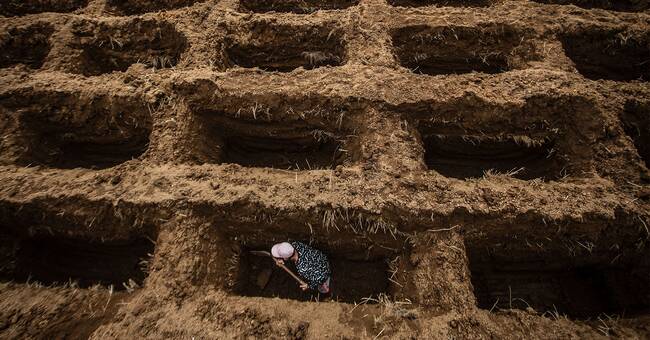This pink rose is in memory of my aunt Giyem.
I planted the red one for my aunt Paiyem.
That one is over to honor my cousin Sri Kanthi, ”says my wife.
Since the beginning of June, she has planted a new rose here in Sweden for every close relative who died with covid at home in Indonesia.
There have been nine roses.
So far.
The second corona wave now sweeping over Indonesia has been relentless.
Thousands, like our relatives in the village of Java, have fallen victim.
The worst was ahead
When we in Sweden in the spring struggled with increased infection and restrictions, Indonesia had not yet been affected to the same extent.
Both we here at home and the relatives in the village thought about what it could be due to.
"Maybe you have some protection there in Indonesia that we lack here," we said.
"It may be the heat and humidity here in Indonesia that are preventing the virus," they replied.
So wrong we were.
So wrong they were.
90,000 dead - but feared dark numbers
At the beginning of June this year, Indonesia had about 5,000 new infections per day.
At the end of July, there are around 43,000 new infections per day.
More than India.
Officially, 90,000 have now died with covid in the country.
According to the voluntary organization Lapor covid-19, however, the real figure is higher than that.
Many people die at home, without having been tested or sought hospital care.
When I talk to Yemiko Happy from just Lapor covid-19, he tells me that there are several reasons why many never come under care.
Overcrowded hospitals and lack of places is one.
But it is also the case that many people are reluctant to seek care because there is a stigma around the corona in Indonesia.
Anyone seeking care for suspected infection risks having themselves and their family identified as someone they should stay away from for a long time.
Died when the oxygen ran out
"Why risk it when I may not be infected at all but just have a little cough that has passed until tomorrow", many think.
When the person then in the next stage gets worse and has to queue in hospital for a place, it is already too late, and the disease too far gone.
Healthcare in densely populated Java is having a hard time coping with the situation that has now arisen.
People have died in hospitals when the oxygen ran out.
Others have queued for days in a waiting room for a hospital bed.
"If the infection now causes problems in Europe, there is nothing against what an increased spread of infection would do here," said a friend in Indonesia this spring.
So right he was.
Here at home, we now cherish memories of those we will never see again.
And pray that the last rose of the summer is already planted.

